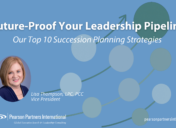Tips from the Leadership Coach: Working with Executive Recruiters
Working with Executive Recruiters
Lisa Thompson, Managing Director, Professional Services
Executive search is a large, yet very fragmented, business. According to the Association of Executive Search Consultants (AESC), industry revenues in 2013 were more than $10.5 billion, yet the 10 largest firms accounted for less than one-fifth of that revenue. There are many reputable and successful search firms you may not be familiar with. Here are some tips from our career coach to more effectively work with executive recruiters in your job search and throughout your career.
Tip #1: Subscribe to an executive search professional directory for use in your search.
To start your search for executive search and leadership consulting firms, you can search the AESC Member Directory for free.. BlueSteps is a subscription-based executive career management service from the AESC that connects you to top executive search firms in more than 75 countries. Custom Databanks is a database of executive recruiters and venture capital/P.E. firms across the U.S. and abroad.
Tip #2: Find out what type of firm your recruiter works for, and carefully consider the impact of these key differences in your search.
There are important differences in how recruiting firms are structured. Basically, there are two types of executive search firms:
Retainer search firms:
- Are hired exclusively by a client company to fill a specific job opening
- Are paid regardless of the results of the search, however, because they are retained, they will almost always complete the search
- Are more often used to fill higher-level positions with salaries of $150,000 and above
- Have in-firm restrictions: Other recruiters within the same firm cannot contact you for a different assignment while your file is being used by a recruiter for an assignment in that firm
- Have off-limits restrictions: If you work for a company that has hired the retained search firm during the last year, you will be off-limits for any other search it may have, no matter how well-qualified you are
Contingency search firms:
- Are more often used for junior and mid-level executives, typically for positions with salaries below $100,000
- Receive payment only when their potential candidate is hired
- Do not work on an exclusive basis with their clients
- Have no or only limited expense budgets paid by a client, so they will not likely travel to meet with you in person
- Work fast and submit as many candidates who are looking for a job as they can, with only minor regard to a specific job description
Tip #3: Be a good source of qualified candidate names. This is one of the most successful ways to get into a recruiting firm’s database for future opportunities.
Recruiters are consultants who work on behalf of clients to fill jobs. All executive search firms are paid by the companies who hire them to fill a position, typically a fee of one-third of the first-year compensation. Search firms are not working for you. Recruiters may contact you if they have a position that fits your profile, or to ask you to recommend other people who might be interested in the job. If you are not interested or not qualified, being courteous, helpful and offering suggestions of other people the recruiter might contact is a great way to be remembered by that recruiter later.
Tip #4: Do your own homework on the company and industry to validate the attractiveness and fit of the opportunity.
Recruiting is a sales-driven business. Recruiters sell employers on their ability to fill specific positions in specific industries, potential candidates on the benefits of the position, and employers on the firm’s final recommended candidates. Remember that the recruiter is selling you on an opportunity where his or her success and remuneration depend on filling the job.
Tip #5: Contact the firm’s research department instead of a senior recruiter in the firm. There is very little chance that you will hear back from a busy recruiter if you put in an unsolicited call or resume.
Recruiters are very busy professionals. They must juggle:
- Marketing services to employers
- Working with research for sources of potential candidates
- Interviewing potential candidates
- Presenting candidates to the hiring employer
- Preparing final candidates to interview
- Debriefing candidates after the interview
- Counseling with the employer on an offer
- Helping with the negotiation process
- Preparing the hired candidate to make a smooth transition to the new position
- Following up with placed candidates and clients regularly
The best way to be considered for an open search is to send your resume to the research department. This information can usually be found on the search firm’s website or in the directories mentioned in Tip #1.
Tip #6: Don’t try to circumvent a retained recruiter. If the position you are targeting has been given to a retained recruiter to fill, you will have little or no chance of being considered unless you go through that retained recruiter.
There are several benefits in working with executive recruiters:
- Visibility: A recruiter presenting you to a client company makes you stand out from the crowd of other candidates. You are good enough to have representation for your career.
- Presentation: You get presented through another trusted party, rather than just your direct contact.
- Financial security: A company paying for a search is generally financially strong.
- Insurance: A company paying money for you is more committed to your success.
- Hidden job leads: Many positions, especially those at the senior level, are assigned as confidential to search firms.
- Interview preparation: A recruiter’s income depends on you landing the job. The recruiter can give you insight into the hiring company and the people you will be meeting with.
- Negotiation: A recruiter’s compensation is usually positively impacted by you striking an acceptable contract with the client company.
- Buffering: A recruiter serves as a useful information channel between you and the company before, during and after the search.
Tip #7: Show integrity, be professional and let the recruiter take the lead on initiatives once you have established a relationship. These qualities will be noted in the firm’s database for future searches.
There are several additional keys to effectively working with executive recruiters once you have been contacted by them:
- Never stretch the truth about job experience, education, income or anything else. The truth will likely surface and negatively affect your chances of landing a job.
- Keep appointments, return calls and cooperate. Don’t play “hard to get.”
- Agree to reference checking. Prove you have nothing to hide.
- Bow out early if you are not really interested. Offer to be a resource, if not a candidate, and always try to help.
- Let the recruiter run interference for you on compensation.
- Unnecessary follow-up is counter-productive. The recruiter will call you if he or she has a reason to call.
- Don’t cultivate an offer to get leverage at your current job. This strategy usually backfires. If you want to be promoted or get a raise, there are better ways to accomplish this. In fact, plentiful research shows counter-offers from a current employer rarely result in tenure beyond 12 months.
- Realize that if 200 prospective candidates are uncovered in initial research, perhaps 50 will make the first cut, five will be finalists, and only one will get the job. Don’t take it personally if you don’t. The search process aims for a perfect fit, and if you are not chosen, it was not meant to be.
Tip #8: Treat your job search with as much planning and intensity as you will use in your new job.
A senior executive in transition needs to have a strategic plan. Make sure your plan includes at least the following elements:
- Reflects your current and long-term goals
- Reflects on past achievements and successes, as well as unmet goals
- Aligns goals with values
- Leverages your strengths and identifies areas of improvement
- Establishes specific goals and actionable tasks with clear action steps
- Is accountable with deadlines and assignments
- Includes an effective strategy for networking, which accounts for more than three-quarters of successful job searches
Leveraging an executive recruiter in your career is something you shouldn’t only do during a job search. Establishing and nurturing relationships with executive recruiters will help you manage your career along the way, stay on their radar, and be front and center when an opportunity arises to put you on the next step in your career path.
Call Lisa Thompson at (214) 292-4145 to learn how senior executive coaching can help you with a tailored, personalized career transition strategy.














